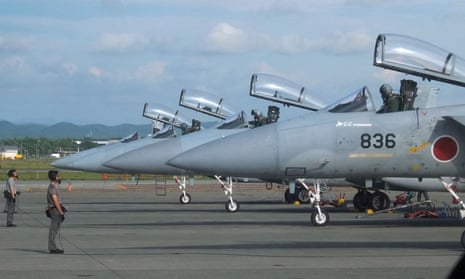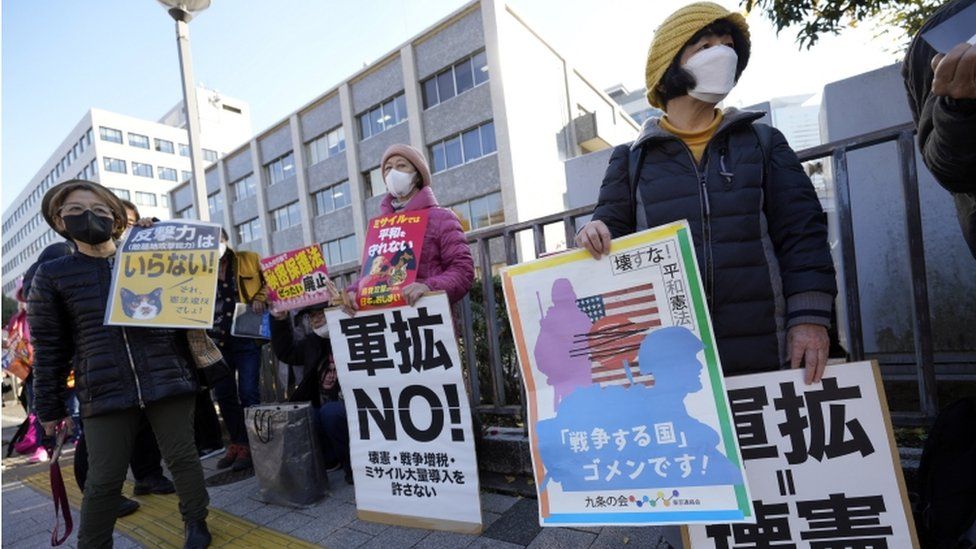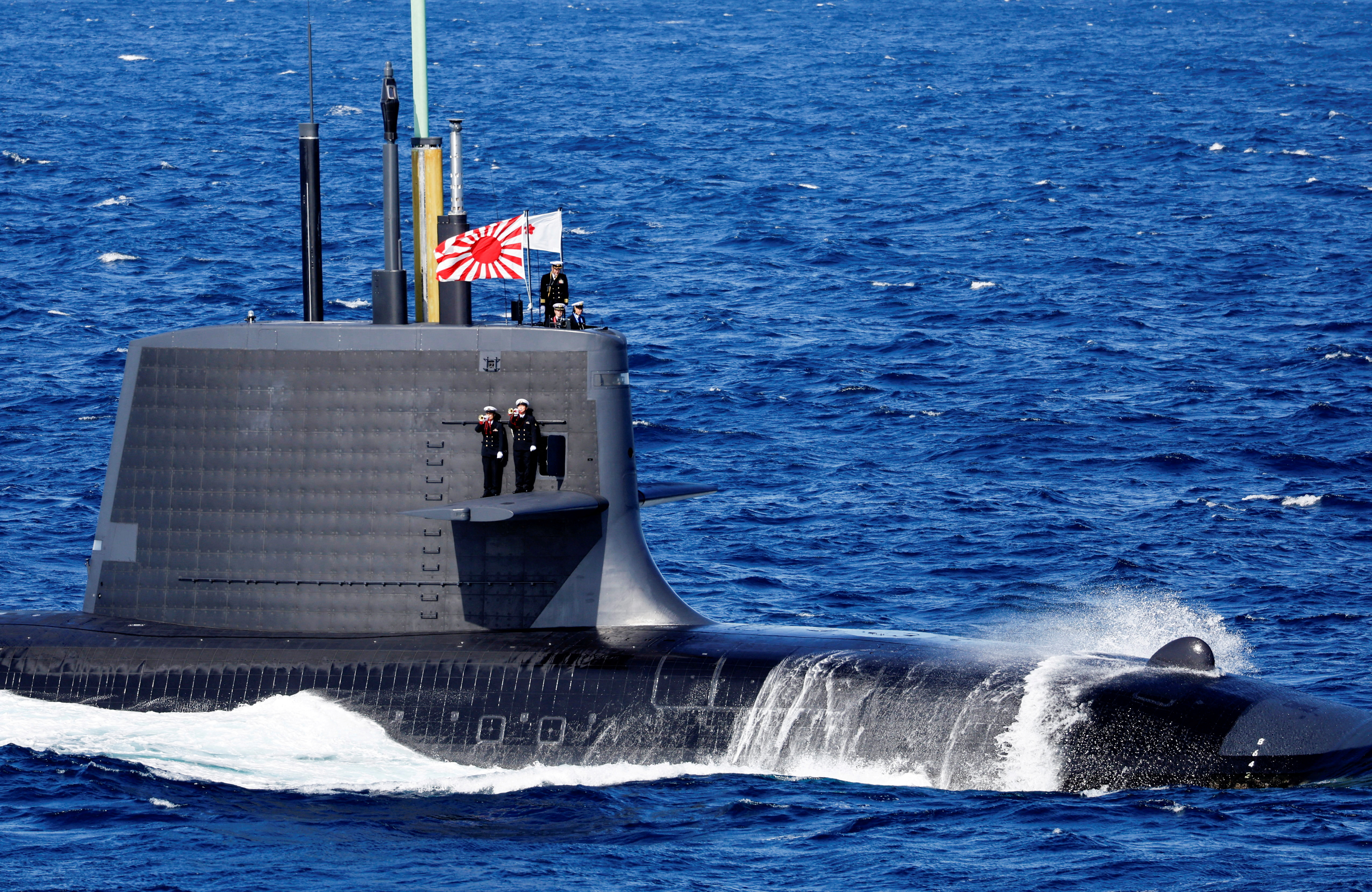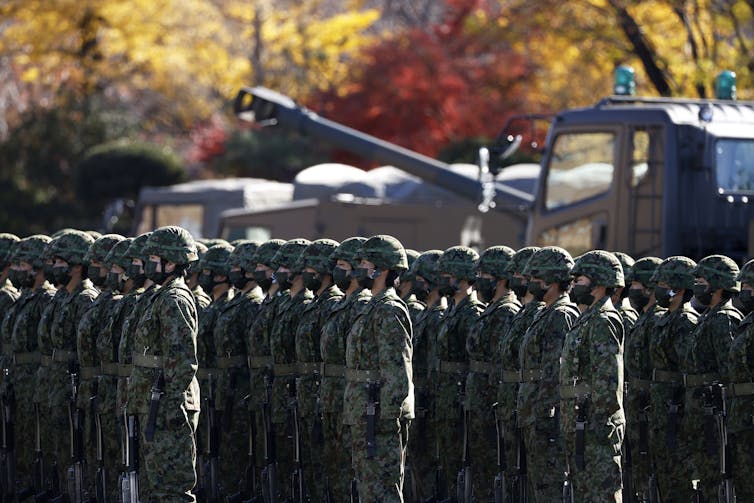The Red Dragon Versus Land of the Rising Sun
"Meanwhile, short-sighted economic policies -- are undermining the integrated world economy that underpins both American prosperity and global peace.""[Japan is increasing its defence spending reacting to U.S. foreign policy established under G.W.Bush, Barack Obama, Donald Trump and Joe Biden] -- two decades of passive incompetence [that failed to anticipate, counter or deter China's massive military buildup].""A perverse synthesis of Trumpian trade policy, half-baked green energy initiatives and knee-jerk, progressive regulatory overreach won't make the world a safer or better place."Walter Russell Mead, Professor of Foreign Affairs and Humanities at Bard College ... Annandale-on-Hudson, New York
 |
| Japanese fighter aircraft at Chitose air base in Hokkaido prefecture. Photograph: Kazuhiro Nogi/AFP/Getty Images |
Japan considers China's new aggressive policies a direct threat; its "biggest security challenge",
leading the Japanese government to declare its intention to increase
military spending to a dramatic extent; $51.4 billion for 2023 alone and
over five years a total of $318 billion "to deal with the most severe and complex security environment since World War II".
This
commitment represents a total shift distancing the country from its
post-World War II position when it pledged and wrote into law that its
military serve solely in a defensive capacity. The Japanese military, in
fact, has been in bad odour with the Japanese public. A public which
viewed the military as a necessary evil to be tolerated and nothing
more. For decades following the end of World War II, a member of the
Japanese military appearing in public in military uniform risked being
mobbed by angry citizens.
And
so military personnel en route to military headquarters or other
military sites would wear their civilian clothing, and then change into
uniform once they reached their destination. Now, the nation has
committed itself to spending roughly two percent of its GDP in a
five-year period with the aim to purchase and develop missiles with an
expanded range enabling Japan to hit targets as distant as China should
it conclude an attack is imminent.
Japan
is prepared to build its own long-range missiles and in the interim to
procure 500 American-produced Tomahawks in the short term giving it
counter-strike capabilities. This, despite an uneasy public opinion poll
indicating that only 56 percent of its population indicated support for
plans to enable their military to attack foreign bases.
 |
| Despite shifting public opinion there is still considerable opposition to increasing military spending in Japan EPA |
Japan's
plans apart from 104-35A and 52 F-35B fighter jets from the U.S. they
are to expend among other major purchases next generation fighter jets
partnering with the U.K. and Italy and with the same partners,
developing a new air-to-air missile. Ranked globally after the U.S.,
China, Russia and India, Japan is fifth in overall military power
currently, but with its new defence budget hoisting it upward to third
place. Its alliances with the West meant to help counter the growing
influence and belligerence expressed by both China and North Korea.
The
current quality of American leadership and commitment represents a
thorn in conventional trust in the globe's sole global power's
commitment level beyond its own security. Washington's traditional
allies are experiencing diminished confidence in its leadership,
stimulating Japan to expand its partnerships and joint military
exercises to Australia, the U.K., France and others, along with ASEAN
nations.
With
China testing the waters as it were, by firing missiles approaching
Japan's southern islands in a show of military force around Taiwan, the
level of tension rose. North Korea further stoked tensions by firing a
missile into Japan's 200-mile Exclusive Economic zone in Northwestern
Japan in September. In reaction to Japan's announcement of increasing
defence spending, North Korea fired two missiles in Japan's direction.
Japanese
fighter planes scrambled over 200 times in 2020, two-0thirds of those
events targeted Chinese war planes, the remainder in response to Russian
provocation. Japan is forced to enhance its maritime security in
response to China's rapid expansion of the size and capability of its
naval force. Defence of the southwestern Nansei Islands and the
disputed Senkaku Islands in the East china Sea a mater of national
security..
 |
| The Uzushio-class submarine of the Japan Maritime Self-Defense Force (JMSDF) sails during the International Fleet Review to commemorate the 70th anniversary of the foundation of JMSDF, at Sagami Bay, off Yokosuka, south of Tokyo, Japan November 6, 2022. REUTERS/Issei Kato/Pool/ |
China
is less than favourably impressed by Japan's declaration of its new
defence commitment. Beijing denounced the new strategy as "a dangerous step that would lead Asian nations to question Japan's commitment to peace";
beyond irony, given Beijing's lack of commitment to peace with its
neighbours as evidenced by its constant claims and provocatively
aggressive acts of 'ownership'.
According to the Chinese Embassy in Tokyo, Japan's decision would "provoke regional tension and confrontation".
North Korea had plenty to declare over Japan's plans, citing them as "a serious challenge to international peace and security";
Pyongyang would continue to ramp up missile and other weapons testing
in its own defence, it declared. Beyond hilarious, if it weren't so
serious..
"Unfortunately in the vicinity of our country, there are countries carrying out activities such as enhancement of nuclear capability, a rapid military build-up and unilateral attempt to change the status quo by force.""These are also now becoming more outstanding. In the next five years, in order to fundamentally reinforce our defence capabilities we will implement a defence build-up program worth 43 trillion yen ($314bn; £257bn)."Japanese Prime Minister Fumio Kishida
 |
Labels: Chinese MilitaryThreats, Defence, Japanese Military Budget, Military Buildup, North Korean Missiles, Offensive, World Security

<< Home